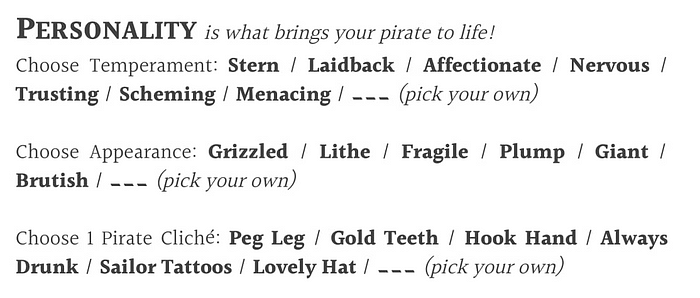
Originally posted to Medium.com Jan 19, 2021
Buccaneers & Brine is a very short RPG about being pirates and doing swashbuckling, pirate-y things. I wrote it to take a break from other projects, and am thrilled that (at the time of writing) its had nearly 200 views and just over 100 downloads, with zero marketing from myself. The full rules are available on the Buccaneers & Brine Itch.io page if you want to check them out.EDIT: Further discussion available on the /r/RPGdesign thread — check it out afterwards!
I am a huge believer in people deconstructing their own projects and speaking about why they made the choices they did. I think its an invaluable way for other creators to have their own “ooh, I never thought of it like that!” moments, and I know for a fact some of my own best inspiration has come from off-hand remarks and comments from designers I follow and admire.
Now that I’ve had some distance from the writing and editing of B&B, I wanted to talk about why I made the choices I did, what I hope those mechanics result in, and the ideas behind the various parts. Hopefully this will give you some of your own inspiration too!
I’m going to go through the various sections of the rules, roughly in order, so feel free to skip around.
Note: I’ve never written one of these before, so apologies if its all over the place!
This one is sort of obvious — I just prefer narrative RPGs. If I’m sitting in a circle with my mates, playing pretend, telling each other made up stories, the last thing I want to be doing is tracking numbers and stats and explaining tons and tons of layered rules.
The explaining of rules is actually a significant point in itself. Introducing people that have never played RPGs before, explaining “hey, we’re gonna be pretend pirates fighting skeletons and stuff”, for Buccaneers & Brine I explicitly want them buying into the fiction of the game — not thinking about nitty gritty boring details. We’re telling a shared story; that is in and of itself the activity we’re doing together. Focus on the fiction, not the numbers.

A Nervous Giant who’s Always Drunk is, canonically, an author stand in
So, character creation — I deliberately get the players to make three simple choices (their temperament, appearance and cliché) instead of one, complex choice (a character class, for example).
Firstly, because being a Laidback, Brutish pirate with A Lovely Hat is more than enough for this game to get going, in terms of seriousness and tone.
Secondly, it’s super flavourful. If you were choosing between Fighter / Rogue / Wizard, well — Wizard sounds exciting, Fighter sounds kind of “meh”, and what the hell is a Rogue? But making a pirate who is Affectionate but Grizzled, or Nervous yet Brutish, or Menacing and Lithe? I challenge anyone to not get an immediate mental image of those scoundrels. Make the players buy into the fiction of the game.
And thirdly, it’s to avoid decision paralysis. By offering a list, and then giving the escape hatch (the “choose your own” option) at the end, each player will either see something they like and pick it, or will see the options, know what they don’t want, and write down something else.
For example, if you’re playing D&D, saying to a player:
“OK, you can be someone who fights things, someone who casts spells, or someone who sneaks around. What do you want to be?”
will often cause the player to say “ooh, uhm, I’m not sure…”; but if you instead said:
“OK, this game has heroes who fight, heroes who cast spells, or heroes who sneak around. I think you’d make an awesome wizard, how does that sound?”